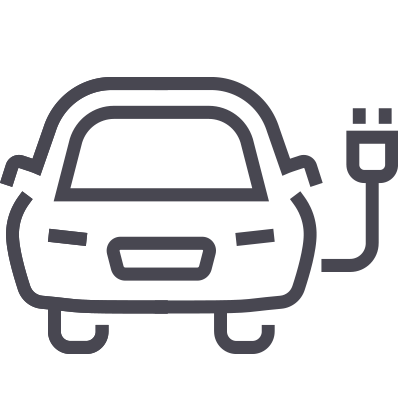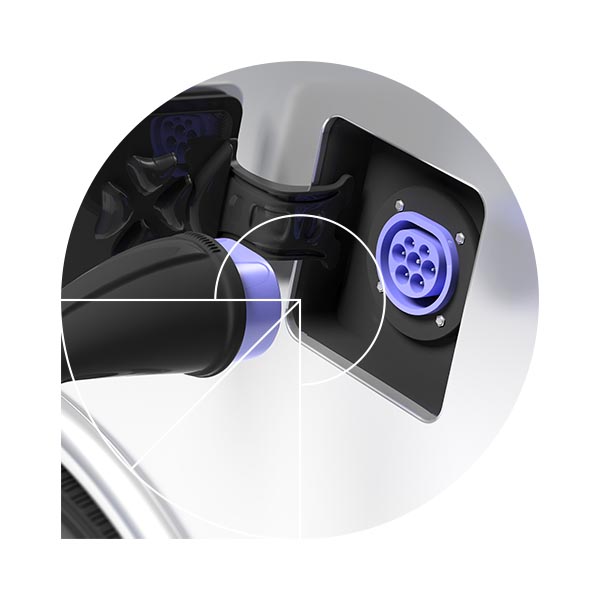Electric mobility
35% of the energy is consumed by transport
The shift to sustainable energy mobility is unstoppable and necessary. Thanks to the new technologies, we now have more versatility when it comes to diversifying fuels and storing energy.
At Helioelec we offer different solutions for the installation of electric vehicle charging points in domestic and public access environments.

Electric vehicles are not the future, they are the present
Why choose an electric car?
Things to keep in mind:
- Electric cars are not expensive. If we add fuel and parking savings, and almost no maintenance, we can definitely say that an electric car is cheaper than a regular one in the long run.
- Electric cars have less maintenance and are cheaper. An electric engine has no maintenance for gearbox oil, oil filter, air filter, fuel filter, timing belt, accessories… And there is also no need to change the battery throughout its life. All this means more than 80% savings in maintenance costs.
- They are very easy and comfortable to drive, as they have only four gears: forward, reverse, neutral and stop, which is where the gear stick is placed before the start button is pressed. This is especially noticeable in large cities, making driving much less stressful.

- Tax advantages for the purchase of an electric car: Free registration tax. Since this tax applies according to CO2 car emissions, electric cars do not have to pay it. The motor vehicle tax is regulated by each City Council through the tax ordinances, which each one of them approves every year. However, the tax rebate reaches up to 75% of the basic quota for a standard vehicle in most cases. Equally as interesting is the blue area parking, which is free or significantly reduced.
- There are no traffic limitations for electric cars in big cities. More and more cities are limiting the entry of combustion vehicles to central areas. Therefore, if we want to be prepared, there is nothing better than an electric car to make sure that we will always be able to use it.
Continuous evolution of the sector
- Autonomy: Originally 120 km -> Currently 700 km
- Slow refuelling: 8 hours -> 25 minutes
- Batteries: under continuous development
- Infrastructure: In progress. “Charging stations”
- Purchase prices: More and more affordable
- Repairs: Vehicles with fewer breakdowns
- Mechanics workshops: Increase in specialised workshops
- Spare parts: All parts are available
- Lack of information: Greater dissemination and promotion
Installation of chargers
In Spain, there are over 40 models of electric cars, which are increasingly autonomous and modern. It is clear that the 21st century is the century of the electric car.
The increase in electric vehicle charging infrastructures is necessary to add to the change, providing charging points to respond to the accessible energy demand for this type of mobility.
At Helioelec, we can install these infrastructures and provide sustainable energy in this regard. We follow the IEC – 61851-1 international standard for electric vehicle conductive charging system.
The objective of the EU is to have a ratio of 1 charging point for every 10 electric vehicles.
With zero pollution, travelling 100 km costs about €0.50.
| Charging time | Required power | Charging mode | Application | |
|---|---|---|---|---|
| Low power charge | 9 hours 5,5 hours |
2,3 kW (10 A-30V) 3,7 kW (16 A-230V) |
1,2,3 | Private parking, households and neighbourhood communities Overnight charge |
| Medium power charge | 2 hours 1 hours |
11kW (10 A-230V) 22kW (16A-230V) |
3.4 | For group charging, located in public access spaces. Shopping centres, town halls, hotels, cinemas, etc. |
| High power charge | 25 minutes | 43,6kW (63A-400V) 50kW (125 A-400 Vdc) |
3.4 | Emergency charge, ultra-fast charge, car-sharing, charging stations, fleets of vehicles, airports, etc. |
MOVES III Plan
Did you know that the Spanish Government offers subsidies for the purchase of alternative energy vehicles?
With the aim of encouraging the purchase of environmentally-friendly vehicles, the IDEA (Institute for Energy Diversification and Saving), under the Ministry for Ecological Transition, has created the MOVES III Plan. The subsidy programme intents to help in the transition to vehicles of this type that do not use traditional fuels, thus making them more efficient and less polluting. These grants are for individuals and companies and reach 9,000 euros in the case of vans, 7,000 euros for cars and 1,300 for motorcycles.
The MOVES III Plan also encourages the installation of charging points for electric vehicles by offering subsidies for infrastructures in both the public and private sectors. This helps in the transition to sustainable mobility and contributes to the reduction of CO2 and other polluting gases, which will in turn help to improve the air quality of cities and the diversification of transport energy sources.
